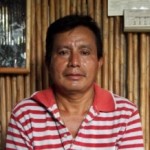A Canadian mining activist confronted Hudbay Mineral’s CEO Alan Hair on the company’s history of violent and repressive conflict with indigenous people during the company’s annual meeting earlier this month in Toronto.
Before asking her pointed question, Rachel Small, a regional organizer for the social justice group Council of Canadians, first summarized Hudbay’s conflicts with indigenous people in Manitoba, Guatemala, Peru and Arizona. Her comments were made before a room packed with Hudbay investors, officers and board members.
Small stated:
At the Rosemont mine in Arizona just two weeks ago the Tohono O’odham Nation, the Pascua Yaqui Tribe and the Hopi Tribe all launched a lawsuit alleging that the mine is going to deprive tribal members of ancestral praying grounds, destroy a critical part of their heritage including burial grounds and stop members from engaging in important cultural practices and religious traditions. And this is just one of several lawsuits (here and here) launched against this mining project.
In Manitoba there have been ongoing conflicts with Indigenous people surrounding the Lalor project. The Mathias Colomb Cree Nation on whose territory this mine sits maintains that Hudbay has not obtained their consent to operate. The chief in fact issued stop work orders on (two) occasions, and band members held peaceful gatherings at the mine site with drumming and ceremonies. Hudbay’s response was to obtain injunctions against the whole First nation and launch a lawsuit against their chief. So this in fact criminalized the MCCN people who live off of the land and prevented them from hunting and fishing on their land.
In Peru at the Constancia mine there have been major protests involving thousands of people since the project started denouncing a lack of consultation, lack of transparency, the environmental impact, and that Hudbay has been breaking promises made to communities. The Peruvian government has declared a state of emergency in the zone that includes the Constancia project in order to quash resistance to mining. So communities there are now asking how Hudbay can justify operating in a militarized area where civil liberties have been suspended.
And regarding Hudbay’s former operations in Guatemala, the Fenix Project, there are three lawsuits proceeding in Canadian courts, not to mention ongoing trials in Guatemala, holding Hudbay accountable for gang rapes of eleven women during illegal evictions, the murder of Adolfo Ich, a community leader resistingthe project, and the shooting of another person, German Chub. (Hudbay denies any involvement in the murder of Ich, the Chub shooting and the gang rapes.)
And just two weeks ago, Hector Manuel Choc Cuz, an 18-year-old in that community of El Estor, was beaten to death. This is the nephew of one of the claimants in this case, Angelica Choc, whose husband (Adolfo Ich) was murdered by Hudbay’s employed security. (Hudbay has not commented on last month’s beating death.)
Small then followed up with her question:
On your website it says, ‘Productive, mutually respectful relations with First Nations are a priority for Hudbay.’ Given the examples I listed, which are just some of the serious conflicts and harms that Hudbay has caused with indigenous people at every single one of your mine sites, how can you maintain that relationships with indigenous people are a priority?”
Hudbay’s top officer Hair appeared to be caught off guard by the question.
“That was quite the question,” he responded. “You obviously present a certain view. I would suggest that Hudbay would put forward completely different points of view.”
Hair said that Hudbay has been “recognized by a number of stakeholders as being perhaps if not the best in class certainly up there.”
He then acknowledged there is “very extensive debate” about the merits of mining and Canadian mining companies and said, “I don’t intend to enter into that debate here.”
Nevertheless, Hair said he was “confident that we as a company and certainly under my watch have carried out our business appropriately and tried to engage constructively where we have people opposed to mining.”
Hair said he could raise examples of other mining companies that “maybe don’t perform as well as Hudbay.”
“Do you want companies like Hudbay that respect human rights, that try to engage constructively with communities, that do follow all the legal processes to operate the mines or would you be happier with companies that maybe use child labor or the equivalent of blood diamonds for copper?
“I think you might have to ask yourself that question.”
Hudbay’s relationships with indigenous people and its history of environmental violations in Manitoba are the focus of the 2015 documentary “Flin Flon Flim Flam.”




THERE IS NO SUCH THING AS A ” CLEAN ” MINING COMPANY ANYWHERE IN THE WORLD . HUDBAY IS NO EXCEPTION .
THE MINING INDUSTRY BRINGS OUT THE RACIAL INEQUALITY BETWEEN MONEY AND POWER VS SURVIVAL . WHY DOES THE US GOVERNMENT ALLOW HUDBAY TO DO BUSINESS IN THE USA IN LIGHT OF THE NEGATIVE PUBLICITY AGAINST IT ? HUDBAY IS PAINTED AS A ” MONSTER ” PREYING ON WOMEN AND CHILDREN .
IT IS TIME FOR THE OPPOSITION TO THE ROSEMONT PROJECT TO SPONSOR A WRITE IN TO ALL GOVERNMENT AGENCIES AND POLITICIANS IN ORDER TO DENOUNCE THE POLICIES OF THE PRESENT GOVERNMENT . WHY IS HUDBAY , A FOREIGN COMPANY , DOING BUSINESS IN THE USA .
MID TERM ELECTIONS ARE COMING SOON . THE VOICES AND VIEWS OF THE OPPOSITION DESERVE TO BE HEARD NOW . TURN DOWN HUDBAY’S APPLICATION AND THEY WILL BE GONE , THUS REMOVING THE ” MONSTER ” FROM YOUR MIDST .